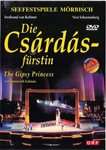|
Back
02/19/2015
Emmerich Kálmán: Die Csárdásfürstin
Vera Schoenenberg (Sylva Varescu), Edwin Ronald (Ferdinand von Bothmer), Kerstin Grotrian (Countess Stasi), Markus Werba (Count Boni Káncsiánu), Harald Serafin (Leopold), Mirjana Irosch (Anhilte), Frigyes Harsányi (Feri Bácsi), Michael Gampe (Lieutenant-Colonel Rohnsdorff), Lili Gesler/Janina Goy (Mädis), Gottfried Falkenstein (Notary), Karl Hoess (Major Domo), Lajos Padar (Gypsy violinist), Mörbisch Festival Choir, Ballet and Extras, Bernard Schneider (Chorus Master), Mörbisch Festival Orchestra, Rudolf Bibl (Conductor), Helmuth Lohner (Stage Director), Josef Weinberger (Video Director), Rolf Langenfass (Set and Costume Designer), Friedrich Rom (Lighting Designer), Giorgio Madia (Choreography), Dance School Mühlsiegl (Quadrille Production), Vienna Technical Event Consortium (Aqua Show), Fireworks Jost (Fireworks)
Recording: Bauernkapelle St. Georgen, Austria (2002) – 132’
Videoland Klassik #VLMD 009 – Booklet in German, English, Italian, French and Chinese - Subtitles in English, French and Italian (Distributed by Naxos of America)

   
One of Kálmán’s most notable operettas, The Gypsy Princess, premiered at the Johann Strauss Theater on November 17, 1915. Despite its racy template involving royalty and demimonde-esque cabaret singers, Viennese audiences met the work with enthusiastic approval. The music is laden with perky tunes (frequently and tiresomely repeated) with injections of somberness due to Kálmán’s loss of his brother during the compositional process.
Physically impressive, Vera Schoenenberg is poised with an aura of being a runway model. Her soprano voice is fully capable of tacking the highest of notes without any resistance, and this is a splendid spectacle to see and hear. Unfortunately, however, her voice appears too legato in the opening of Act I and she’s too stoic. Overall the performance is exceedingly satisfactory.
Ferdinand von Bothmer sings the role of Sylva Varescu’s admirer, Prince Edwin Ronald with genuine brightness; however, the ardor for the cabaret singer comes across as being too timid and contrived. A certain stiffness makes his character come across flat.
Conversely, Harald Serafin and Mirjana Irosch, playing the characters, Leopold and Anhilte, respectively, add genuine warmth and hilarity to the plot with a majority of spoken dialogue. Their daughter, Countess Stasi “Anastasia”, sung by Kerstin Grotrian, has youthful vibrancy with appropriate dashes of immaturity.
Choreography by Giorgia Madia is exceedingly clever but, at times, it isn’t crisp enough due to the complexity of the footwork set against the quick bars of Kálmán’s scoring. The “Quadrille” in Act II is brilliant. Under the direction of the Tanzschule Mühlsiegl, this dance helps “weave” the dialogue between characters and under the frequently repeated command, croisé...fabulous.
Rudolf Bibl’s orchestration has tangy possessions, but synchronization with singers goes off track several times. Specifically in Act I, Ms. Schoenenberg appears to want to “milk” (and too much legato) the notes while Bibl insistently “pushes” the music. There is conflict and it is rather bothersome. Bibl is correct on that matter.
The costuming is extremely lavish with richly decorated textures, compliments of Rolf Langenfass. The mannequins in Act I look tacky and are extremely “grade schoolish”...supposedly depicting the seedy undertones of the Burgtheater’s back stage door and what lurks inside. His sets are immense and extravagant and come to life throughout many of the chapters with use of Friedrich Rom’s percolating lights. All of this “eye candy” is grounded by the paprika-infusions of Emmerich Kálmán’s music.
Christie Grimstad
|